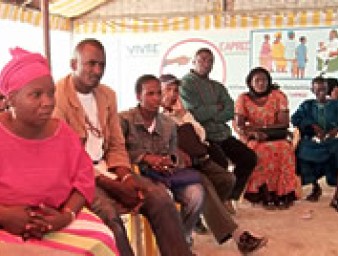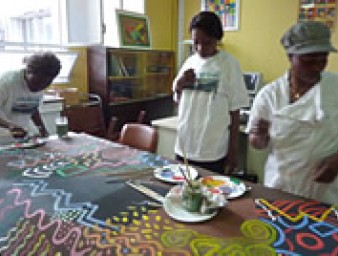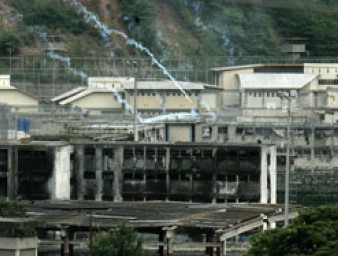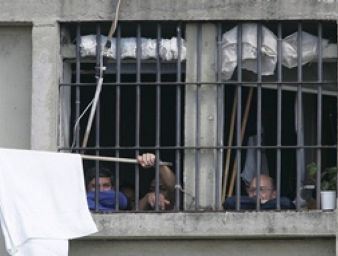“A victim of torture is one too many,” says UN expert
13 July 2021

Since 1981, the UN Voluntary Fund for Victims of Torture has helped an average of 50,000 victims of torture every year in countries in every region of the world. A special webinar was organized to mark the 40th anniversary of the Fund and the International Day in Support of Victims of Torture, by the four UN mandates working against torture, in partnership with UN Human Rights and the American University, Washington College of Law, Center for Human Rights & Humanitarian Law.
"A victim of torture is one too many," said Nils Melzer, UN Special Rapporteur on Torture at a special webinar held to mark the 40th anniversary of the UN Voluntary Fund for Victims of Torture (the Fund) and the International Day in Support of Victims of Torture. "It's a man-made disaster that we can end here and now if we so decide."
While thousands of people around the world continue to be subjected to torture every day, the webinar discussed the urgency in fostering an open and secure civic space for victims in order for them to obtain accountability, reparation and rehabilitation. The panel was organized by the UN Human Rights Office, in coordination with the American University, Washington College of Law, Center for Human Rights & Humanitarian Law.
Since 1981, the Fund, the first of its kind at the UN, supports hundreds of civil society organizations worldwide to assist victims of torture in their challenges to receive redress, explained Ilze Brands Kehris, UN Assistant Secretary-General for Human Rights.
Thomas McCarthy, the first Secretary of the Fund, noted the Fund's historic beginning. Before the Fund's inception, he explained, the UN Trust Fund for Chile was created in the late 1970s to provide support to victims whose human rights had been violated by detention or imprisonment in that country. The General Assembly recognized that torture was occurring worldwide, so they expanded the mandate to have a global reach and established the Fund, he said.
Civil society organizations play a crucial role in protecting torture victims, even while working in constrained environments, Kehris explained. Many challenges include harassment and threats, criminalization of activities leading to arrests and lawsuits, and less access to funding. These roadblocks continue to increase, especially online, due to the COVID-19 pandemic.
"We are seeing the ability and freedom of civil society representatives shrinking online – of particular concern in times of a pandemic and the growing influence of virtual platforms in policy and decision-making processes and free debate," Kheris said.
Even with these challenges, the Fund has awarded 4,887 grants to 630 organizations in 139 countries for over USD 180 million, said Dr. Vivienne Nathanson, Chair of the Fund. This year, the Fund is awarding 172 direct assistance grants to help nearly 50,000 victims of torture in 70 countries worldwide, she added.
"Hundreds of thousands of torture survivors and their families all over the world receive medical, psychological, social, legal, humanitarian and other support, allowing them to recover from the trauma of torture and rebuild their lives," Nathanson said.
One of the first grantees of the Fund in 1984, the Comité para la Defensa de la Salud, la Etica y los Derechos Humanos (COSDESEDH) in Argentina currently provides medical, psychological, legal and social services to 465 torture victims, said Dr. Norberto Liwski, President of CODESEDH. He stressed the importance of offering victims and their families comprehensive care to overcome post-traumatic stress.
"These areas must have interdisciplinary teams duly and rigorously trained in ethical values and sustained professional intervention from the perspective of human rights," Liwski said.
While the Fund enables victims to recover from trauma, there are preventative monitoring measures found in the Optional Protocol to help prevent torture from taking place such as making unannounced visits to places where someone is under continuous supervision, control and not free to leave, according to Suzanne Jabbour, Chairperson, UN Subcommittee on Prevention of Torture.
For those organizations in fear of reprisals, the UN Committee against Torture and other treaty bodies adopted guidelines in 2015 on the handling of allegations of reprisals against individuals and organizations cooperating with Committees.
"In the past years, we have observed cases of reprisals against organizations that provided information to the Committee, either during the reporting procedure, during the individual complaints procedure or during the enquiry procedure," said Claude Heller, Chair, UN Committee against Torture.
Civil society face many challenges in their work. The Human Rights Foundation of Turkey (HRFT) is an organization helping to rehabilitate victims where there is an increase in the systematic and widespread practices of torture. A grantee of the Fund since 2008, HRFT has aided 3,800 torture survivors at its five rehabilitation centers, according to Elçin Türkdoğan, HRFT Programmes Coordinator.
"The crackdown on civil society in Turkey has intensified since 2013," Türkdoğan said. "In the current oppressive atmosphere in Turkey, torture survivors may refrain from applying for rehabilitation or may interrupt rehabilitation due to fear and security concerns."
HRFT has been able to continue its work by relying on its strong network of volunteers and supporters, deepening their creditability among society to build trust, and utilizing their expertise in operating in extreme environments, Türkdoğan said.
A grantee of the Fund since 2020, the Centre for Human Rights Education Advice and Assistance (CHREAA) in Malawi provides legal education, advice and assistance to prisoners, as well as paralegal services to prisons, courts and police. As a way to work within the constraints, Victor Mhango, Director of CHREAA, leans on international networks and the media for assistance.
"The media is very important because it captures the story," Mhango said. "If something happens to you, everyone will know."
The Fund is harnessing the anniversary to host a series of events throughout the year and share the hard work the grantees are doing worldwide, Nathanson said.
"These brave people who have survived torture have gone on to become activists in the anti-torture community, global leaders and human rights defenders and many were tortured as a reprisal for their commitment to human rights work," Nathanson said. "Grantees bring a richness to the work globally and we will continue to support them."
13 July 2021




